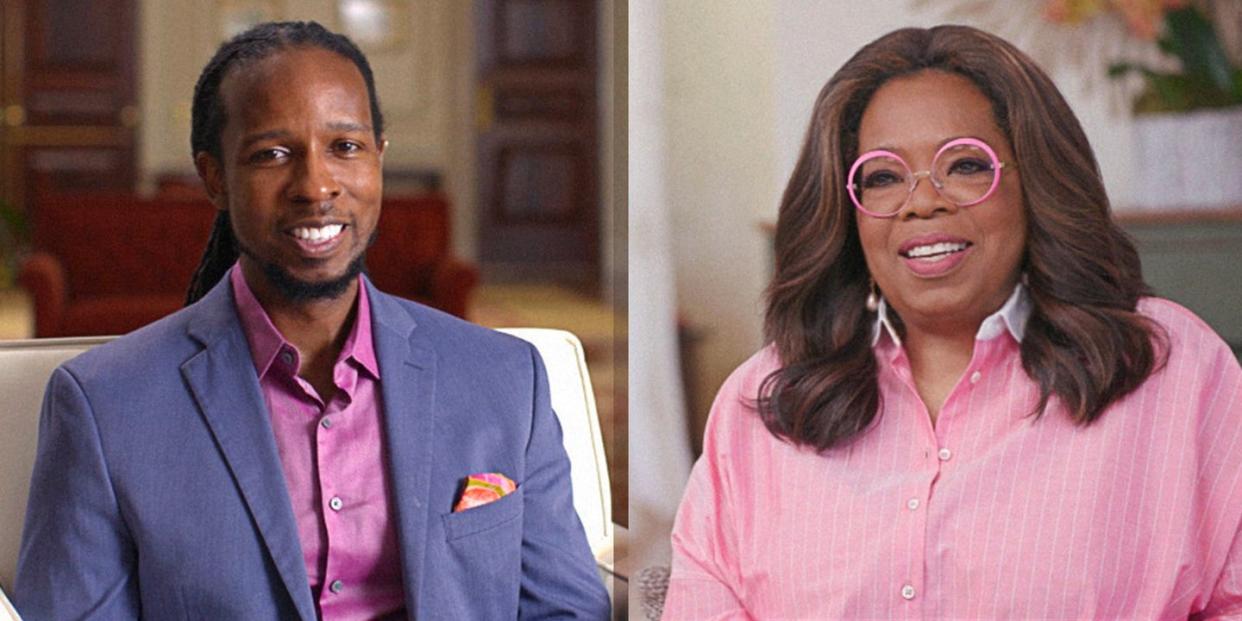Oprah Explains How to Be "Antiracist" on Her New Show

The Oprah Conversation is a brand-new talk show streaming on AppleTV+, which will explore "impactful and relevant topics with fascinating thought leaders from all over the world."
Guests include Emmanuel Acho, Bryan Stevenson, and Professor Ibram X. Kendi.
In the episode out August 6, Oprah and Kendi will discuss principles of antiracism, alongside five white guests who read his book.
For 25 years, Oprah captivated America with her beloved talk show, The Oprah Show. Her brand-new series, streaming exclusive on Apple TV+, is a different talk show—one made for a different America. Each episode of The Oprah Conversation features Oprah having urgent conversations with thought leaders about the issues that affect us all.
In this week's episode, Oprah and Professor Ibram X. Kendi, bestselling author of How to Be an Antiracist, discuss the concept of antiracism. While introducing Kendi, Oprah explains the paradox of the moment: Racial injustice is prevalent, yet virtually nobody considers him or herself to be racist.
"This moment has magnified the intensity of racial injustice to such a level that it's undeniable for most people who are willing to see it, yet if you were to ask most people in America, 'Are you a racist?' Most people would answer no. We know no one wants to call themselves a racist," Oprah says.
Enter: The idea of "antiracism," which Kendi explores thoroughly in his New York Times-bestselling book. Being antiracist calls for a more proactive, introspective approach than simply denying racism, Kendi says. "Saying you're not a racist is not the same as being an antiracist. They are two very different ways of living in the world," Oprah explains.
During the episode, Oprah and Kendi spoke to white readers of the book who have confronted their own racist beliefs in the past months. Addressing the episode's five white participants, Oprah asks if their perspectives have changed since the protests sparked by the George Floyd's murder by police officers in May of 2020. "Do you have a broader awakening to racial justice? Do you now see things differently? And what will it look like for you to be an antiracist? How do you want to move forward?" Oprah inquires.
One participant named Nick candidly spoke about the impact Kendi's book had on him, especially when it came to clarifying what it really takes to be an ally to the Black community. "This book completely shifted my perspective of what my role and responsibility is," Nick said.
At first, Nick said, he picked up Kendi's book to better guide his conversations with fellow white people. "I'm not a confrontational person. I was wrestling with my feelings with guilt and shame. I wanted to learn in order to have those difficult conversations with family or acquaintances, or whenever I was confronted with racist ideas," Nick said.
However, after reading How to Be an Antiracist, Nick learned that allyship also requires championing people who are fighting for a better, more equal world. "After reading the book...I have a much better idea of my role as an ally. Which is to have those conversations, and to support those people advocating for policy change that is required. Donating to organizations on the front line. Supporting Black businesses. That's the key takeaway for me," Nick said.
During the wide-ranging conversation, Kendi also spoke about the concept of "Black deprivation," which he calls the "opposite" of white privilege. "What other people are being deprived of because of the color of their skin is the other side of the coin," Kendi explained.
As an example, Kendi pointed to different life expectancies associated with Black and white populations. "If you want to talk about white people living three-and-a-half years longer, on average, than Black people, that means that Black people are living three-and-a-half years less," he said.
The same can be applied to living arrangements. "White poor people have advantages because they're more likely to live in mixed income neighborhoods. That means Black people are deprived of the ability to live in mixed income neighborhoods and are more likely to live in low income neighborhoods," Kendi said.
To catch the rest of Oprah and Kendi's illuminating conversation, head over to AppleTV+ starting at 7 p.m. ET on Thursday, August 6. The episode is available to AppleTV+ subscribers.
For more stories like this, sign up for our newsletter.
You Might Also Like

